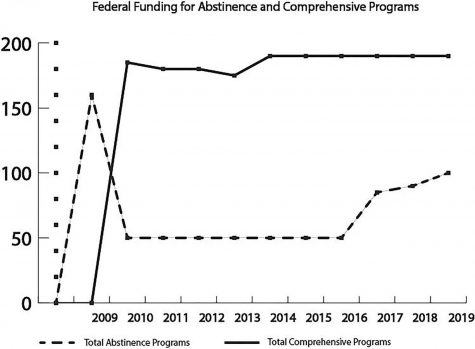More colleges are taking an anti-test stance for admissions
This is a set of statistics about the changes in applicants to Hampshire University after their first year of going test-blind. “The quantity of applications went down but the quality went up, likely because we made it harder to apply, asking for more essays; Our applicants collectively were more motivated, mature, disciplined and consistent in their high school years than past applicants,” an article published by the university said.
November 27, 2019
Increasingly more colleges and universities are beginning to change policies requiring SAT/ACT scores on their admission applications. With studies proving the drastic stress these tests bring students, as well as the inherently classist and racist nature of standardized tests, many view this as a big step forward for post-secondary institutions.
South graduate Lydia Lupanc, who attended Augsburg University after graduation, shared that “when my sister was in high school and she was taking the ACTs, she really was stressing about it and it really freaked me out. So when it was my turn, I was really freaking out… I think junior year honestly was such a hard year and people always say that it’s such a hard year so having to take that ACT… is super stressful.”
For Zupanc, ACT testing brought a lot of stress and self-doubt to junior year. “With the colleges that I did have to send my test scores in, it really made me doubt that I was gonna get in,” she explained. “Just the fact that everything was riding on that one score was a lot of pressure and kind of unnecessary in my eyes.”
In addition to the obvious stress such high pressure tests bring, it is widely believed that the SAT and ACT function in classist and racist ways. This is due to the high expenses for specialized testing tutors/materials, and the fact that test questions are often worded in a way which assumes a student is, for example, a native English speaker. Therefore, there is a lot of evidence that says that these tests strongly nourish the achievement gap.
The term achievement gap is defined by The Glossary of Education Reform as “any significant and persistent [large difference] in academic performance or educational attainment between different groups of students, such as white students and minorities…or students from higher-income and lower-income households.”
“It causes disparities and that’s why a lot of colleges are moving to test optional. There are some kids who can’t afford to pay [for test prep]…and then it becomes biased where it’s like ‘I couldn’t prepare for my test whereas this person had a private tutor,’” said Nneka Abdullah who worked in the College and Career Center at South but has now transferred schools.
“My personal opinion on the benefits [of test-optional schools] is that it gives more students more opportunity,” said Abdullah. “Students are more than a test score, their GPA might be high or they might have different skills and abilities that might not show in a test score, so when a school is test optional that gives those types of students more opportunity to apply and be accepted to attend the post-secondary institution of their choice,” she elaborated.
Zupanc said that in her experience “there’s so many people…who are in college now and have taken the ACT/SAT and they just don’t understand why they needed it.”
“It doesn’t really prove anything about them and it doesn’t reflect their true abilities,” Zupanc continued.
There is an opinion amongst some critics however, that even being “test-optional” is not a far enough step, because if a student chooses to submit their score then they could be seen as better than the students who do not make that choice. To avoid possible leverage, the thought is that schools should choose to full ban scores form their applications, making them “test blind.”
According to a study done by Hampshire University on their own application statistics in their first year of completely eliminating SAT/ACT scores from applications, their applicant diversity increased to 31% students of color. This was historically their most diverse class; it had been 21% two years before the study was done.
One barrier that keeps colleges from taking the step towards being test optional is that it disqualifies them from being included on many competitive ranking lists. This puts a university at a technical disadvantage compared to other schools.
However, many schools are looking over this possible disadvantage for their reputation. “The colleges know that [test scores are] not making it accessible for everyone so that’s why they’re moving towards [being test-optional],” said Abdullah. “They want to get more students of color, students with different abilities, learning and physical differences, students who are english language learners.”
There are many perceived advantages of test-optional schools. In an article posted by Hampshire University on their decision to ban test scores from applications to their university, they stated that they have been pushed to become better at thinking about applicants as a whole, complex human that each student is.
“Standardized testing reflects a very small window of a students academics, intelligence, and life experience. I think that the benefits of [colleges] not requiring standardized testing is focusing more on the student as a whole person rather than just as an academic student,” said Gear Up staff member Ellie Marran.
There is more open mindedness involved in the process of evaluating a person as a complex individual when you do not get the initial impression of how the student performed on a test. A student should make sure that they’re being mindful of the other areas that a school may evaluate: “[Students considering test optional schools] need to make sure that they do have a high GPA, that they’re involved in extracurriculars and other activities at school that show that they’re capable of being successful in college,” said Abdullah.
“[If] they’ve shown that they can balance school, life outside of school-including school activities, and a social life; then they’re going to be great in college,” said Abdullah.
Marran also pointed out that when a student is not stressing about their ACT or SAT scores for college, “the focus is on other places, rather than one number that they got on one test, which is really great.” She feels that rather, students and schools should put emphasis on their college essay.
“In my experience, I’ve seen a lot of students really kind of blossom in their essay. When I was applying to college, I felt that my essay was the best snapshot of who I was,” said Marran. She said she enjoyed “telling [the U of M] who I am as a person, and this is what I will give to your school, rather than ‘here are my grades.’”
Marran gave the advice that “being as authentic as possible in your essay, focusing on the person you want to be in the community for that school, what you want to give to the school as a student and as a community member, and what you’re excited about,” is the best approach to take in your essay.
Zupanc said that she “had to write more essays for Augsburg than I did for any other school, but I’d say that I didn’t really mind because they give you a ton of different prompts…you get to choose what you want to write about,” she said. “If you pick something that you genuinely want to write about then you can write a really, really good essay.”
In Minnesota, there are multiple colleges that have shifted to a test-optional approach to their applications. Augsburg, Concordia, Dunwoody, and other technical schools are all options if you want to avoid the factor of your test scores in possible acceptance.
While more and more schools go test-optional, the ACT itself has also changed to more progressive policies this year. Students taking the ACT can now find comfort in the fact that if they feel unhappy with a section score on the test, they may now choose to retake a specific section at a time, rather than having to retake the entire test.
In addition to the new retaking rule, a new policy has also been put in place to help legitimize the use of “super scores”. A super score is a score that combines the highest scores from each individual section from each time they took the test to make their cumulative score. Before this rule came to be, students who have taken the test more than once and want colleges to see their best subscores, they have to send in multiple test results.











![MPS has contracted a software company called Gaggle to monitor student accounts and writing to identify possible signs of suicide ideation, self-harm, harm to others, signs of depression, exploitation, or bullying. “I would feel comfortable saying that we’ve saved some lives with what we’ve done with [Gaggle],” said Jason Matlock, the Director of Emergency Management, Safety, and Security at MPS.
However, many students are unsure of what Gaggle does or unaware that it even exists. Aesha Graffunder, a sophomore at Roosevelt said, “I see little to no problem with Gaggle itself, its purpose is to provide schools with information that can help protect students. I see way more of a problem with school administrations and how they handle the flags they get from Gaggle.”](https://www.shsoutherner.net/wp-content/uploads/2021/03/computer-2-475x317.jpg)





Robert Schaeffer • Nov 27, 2019 at 1:09 pm
A comprehensive database of more than 1,060 accredited, bachelor-degree granting schools that will make admissions decisions about all or many applicants without regard to ACT/SAT scores is available free online at: http://www.fairtest.org/university/optional — the list includes 365+ colleges and universities with test-optional policies that are ranked in the top tiers of their respective categories